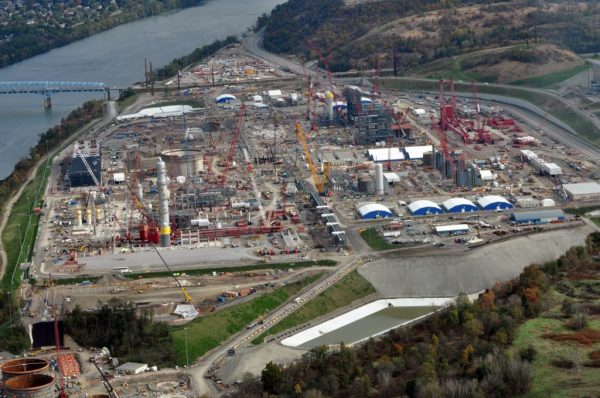- Like
- Digg
- Del
- Tumblr
- VKontakte
- Buffer
- Love This
- Odnoklassniki
- Meneame
- Blogger
- Amazon
- Yahoo Mail
- Gmail
- AOL
- Newsvine
- HackerNews
- Evernote
- MySpace
- Mail.ru
- Viadeo
- Line
- Comments
- Yummly
- SMS
- Viber
- Telegram
- Subscribe
- Skype
- Facebook Messenger
- Kakao
- LiveJournal
- Yammer
- Edgar
- Fintel
- Mix
- Instapaper
- Copy Link

The Shell ethane cracker plant under construction in Beaver County, PA, along the Ohio.
The quote, “if the people lead, the leaders will follow” seems to be the only realistic path we can take when it comes to solving the problem of climate change. This sentiment was very aptly expressed by fifteen year old Swedish student Greta Thunberg when she addressed the climate talks in Poland last December. She said she had not come there to beg, “you have ignored us in the past, and you will ignore us again.” She told leaders, “you are not mature enough to tell it like it is.”
Greta is correct. We have been begging and we are being ignored. We beg for public meetings to be able to express our concerns about health and environmental effects of fracking and the build out associated with it. We beg our local leaders to listen to science experts rather than industry pundits. We beg for regulatory agencies to step up and do their jobs, to protect human health and the environment. We beg for media to publish fair and balanced stories instead of fluff pieces pushing fossil fuel agendas.
We take part in EPA hearings where our concerns are ignored and our three minutes of token participation is a mere formality in the process. Our local leaders claim to be unaware of any health effects or environmental issues associated with the petrochemical buildout yet refuse to be educated, to read peer reviewed studies, or listen to scientists when presented with valid evidence of harm. Our regulatory agencies have become rubber stamps for permits and often dismiss citizens requests for information or are evasive when questioned. Seldom does media ever report the negative effects or externalities of a fossil fuel project.
Sadly, future generations, who have everything to lose if climate change is not addressed, are never considered when decisions are made about pipelines, fracking, injection wells, or cracker plants. Our leaders are short sighted, unimaginative, and as Greta said “not mature enough to tell it like it is.” and also as Greta said, “are moving forward with the same bad ideas that got us into this mess even when the only sensible thing to do is pull the emergency brake.” We are facing catastrophic threats from climate change. Instead of recognizing the role that fracking plays in this process, our leaders are turning a blind eye and continuing to “ignore us again.”
So instead of waiting for our leaders to finally admit we are in a crisis, we need to take the fight to save our planet into our own hands. We can do it. There are more of us that care than there are climate deniers. It will not be easy however. It will require taking a long hard look at our lifestyles and habits. It means that sometimes we will have to sacrifice convenience. We will have to work a bit harder. We will have to realize that every purchase, every action, every step we take must be examined for its future impact on the planet.
If we reduce our use of plastics, especially the forty percent that are single use only, there will be no need to build additional cracker plants. Your plastic water bottle is one of the 60 million water bottles that are thrown away each day. Think of the impact we could have if we all changed a few things in our lives, such as: use a refillable stainless steel water bottle, never buy sports drinks or power drinks in plastic, use powdered laundry detergent or something like Dropps instead of big plastic detergent containers, use butter in stick form instead of plastic tubs, carry reusable bags to the store instead of using plastic bags, use bouillon cubes instead of broth packaged in plastic cartons, whip your own whip cream and avoid another plastic container, use juice concentrate in a cardboard container with metal ends, try to buy fruits and veggies not wrapped in plastic, use bar soap, bar shampoo and bar conditioner and eliminate plastic in the bathroom, make your own toothpaste with baking soda and peppermint oil, use baking soda and vinegar for cleaning rather than petroleum based, scented, dangerous chemicals in plastic bottles, and write to your grocery store to request less food packaging for all items.
If we cook at home rather than eating out, especially at fast food restaurants, we can cut down on our plastic footprint. Ever notice how much waste, especially plastic waste, is left after one simple meal at a fast food restaurant? Carry your own reusable straw and silverware too. Instead of using a styrofoam doggie bag from a restaurant, take your own reusable container.
If we grow a garden we can have access to fresh veggies, get some exercise, save some money and cut down on packaging. The garden can even help provide food in winter months if we are willing to can our veggies.
If we limit the amount of synthetic fabrics we buy such as fleece, rayon and polyester, and opt for cotton, linen and other natural fibers we will help decrease the amount of microplastics in the environment.
With all the plastic bags from items like breads and cereals, one never needs to buy plastic baggies or saran wrap again. If you do want to use a wrapper there are many options you can purchase or make, such as beeswax coated cotton fabric wraps.
Our grandparents survived with a minimal amount of plastic in their lives and while we know that plastic will always have a place in our world, especially in medical applications, many of the conveniences of using plastic are just not worth the cost to our environment. New scientific studies show that we now have plasticizers in our bloodstreams and urine, plastic chemicals in our fat tissues and plastic in our feces. Plastics and the chemicals used to make them are endocrine disruptors and can also cause cancer. It’s time to kick the plastic addiction and adopt a greener way of life.









